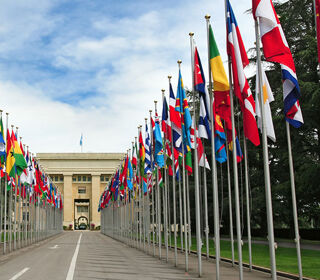
Blog Article

The Centre for Human Rights (CHR) has been engaging with the Universal Periodic Review (UPR) since 2016. Under the auspice of the UN Human Rights Council, the UPR is an intergovernmental process providing a review of the human rights record of all UN Member States. Created in 2018, the UPR Project at BCU engages with the UPR through three streams of work: (1) research, (2) education, and (3) practice.
Our practice-based work includes taking part in the UPR Pre-sessions, providing capacity building for UPR stakeholders (including civil society organisations and National Human Rights Institutions), alongside the filing of stakeholder reports in selected sessions, and international and domestic advocacy.
The UPR Project is designed to help meet the challenges facing the safeguarding of human rights around the world, and to help ensure that UPR recommendations are translated into domestic legal change in member state parliaments. We fully support the UPR ethos of encouraging the sharing of best practice globally to protect everyone's human rights.
Researchers
Consultancy background
The Centre for Human Rights has been engaging with the Universal Periodic Review (UPR) since 2016. Under the auspice of the Human Rights Council, the UPR is an intergovernmental process providing a review of the human rights record of all Member States. Through the UPR Project at BCU, the CHR engages with the mechanism through taking part in the UPR Pre-sessions, providing capacity building for UPR stakeholders and National Human Rights Institutions, and the filing of stakeholder reports in selected sessions.
In September 2019, the UPR Project at BCU submitted its first stakeholder report to the USA’s UPR. Since then, we have submitted reports to the UPRs of multiple countries, including Namibia, Eswatini, South Africa, Pakistan, Gabon, Bhutan, The Gambia, and Lesotho. Our reports are frequently cited by the UN Office of the High Commissioner for Human Rights. You can read these reports as part of our ‘Country Specific Consultancy’.
The Pre-sessions are organised by the NGO, UPRinfo, which brings together UN Permanent Missions, national human rights institutions, and civil society organisations to discuss the key human rights issues in the member states to be considered in the UPR. It seeks to identify stakeholder needs within individual member states, in order to help ensure that stakeholder issues and the claimed human rights violations are adequately reported to the Pre-session to help inform the UPR in the Human Rights Council. The UPR Project has engaged in numerous countries’ Pre-sessions, including Sudan, Namibia, and the UK, having discussions with government delegations and civil society organisations across the world, and impacting upon recommendations made at the UPR.
We engage in capacity building of civil society organisations and NHRIs around the world, in particular through:
- Developing good practice with the Asia Pacific Forum on National Human Rights Institutions, and the Myanmar Human Rights Commission.
- Collaborating with Rights and Security International (https://www.rightsandsecurity.org/) to provide training for NGOs in Kenya and El Salvador.
- Working with the Geneva Academy of International Humanitarian Law and Human Rights providing training for the UAE NHRI for submitting Stakeholder Reports for the UPR.
- The two externally funded projects detailed below: